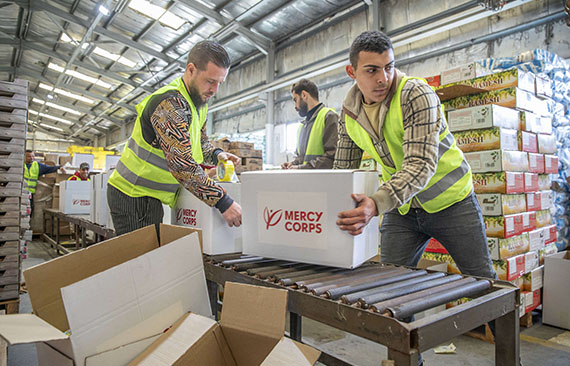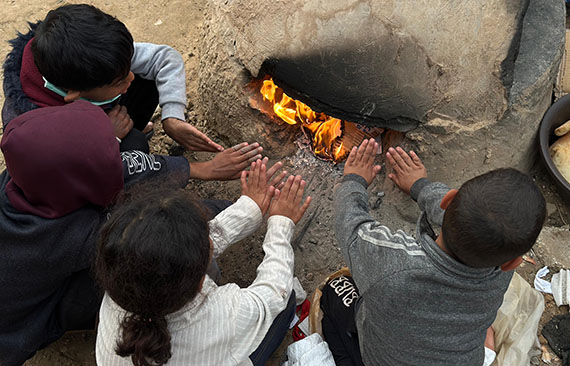Dear friend,
Famine is imminent in Gaza. Up to half the population — 1.1 million people — are facing the most catastrophic levels of hunger and starvation. Evidence indicates a steep rise in child deaths linked to hunger and malnutrition, with one out of every three children under the age of two acutely malnourished in the north.
The new data underscores the horrors the people in Gaza have now endured for nearly six months including daily airstrikes, a dire lack of food and supplies, and the rapid spread of deadly illnesses.
Mercy Corps teams and partners have been navigating these challenges as we continue planning to scale up our response — though without a permanent ceasefire, the aid we can provide will be nowhere near enough to meet the population’s urgent needs.
Read on for more details about our efforts to bring critical aid into Gaza and for more firsthand reports from our team in Gaza.

Workers pack food kits inside a warehouse in east Amman, Jordan. The kits were then flown on a cargo plane to Egypt, where they were unloaded and trucked over the border into Gaza for distribution to vulnerable families and individuals.
Getting life-saving into Gaza
Despite the difficulties in delivering aid, through Mercy Corps’ regional connections and experience, we have coordinated with partners to pack and deliver more than 1,300 food kits in Gaza.
The kits included a variety of ready-to-eat items that require minimal preparation considering cooking gas is not available, like dried fruits, olive oil, and canned vegetables, beans, and meat.
These food kits will no doubt make a difference for the families who receive them, but with 2 million people in Gaza facing crisis levels of hunger, the humanitarian response must scale up dramatically. The heartbreaking fact is that a long line of trucks sit idly, ready to move into Gaza — but they are being held up by authorities at the border. And even this awaiting aid is simply not enough.
Report from a Mercy Corps team member
Mercy Corps team member Waleed (name changed for security) has observed the lack of humanitarian access firsthand and provided this recent report:
 |
"In the north and Gaza City, the aid trucks reaching there are very few, extremely limited, and the assistance doesn’t reach anyone in an organized manner.... Last week, I went to observe the situation of people and trucks and what’s happening, and it was very distressing. Thousands of people are waiting by the seaside in the hope that aid trucks will enter, and after waiting for hours, only two trucks entered."
|
As hunger continues to be weaponized, the grim reality is that without an immediate ceasefire, people in Gaza remain at risk of dying of hunger just miles from trucks filled with food.
Daily life for civilians in Gaza

Children warm their hands next to a clay oven that Gazans are using to bake bread when there is enough flour to do so. Photo © Shadow Pro for Mercy Corps
The struggle to survive continues every day for two million people across Gaza who are taking extreme measures to keep their families safe — from drinking unclean water to making the dangerous trek across Gaza to areas where more aid is able to be delivered.
Asma (name changed for security), a Mercy Corps team member in northern Gaza, sent this recent update on what life is like for her and her family:
 |
"There is no aid in the north. There are only individual efforts; for example, some good people who are outside Gaza transfer money to a person inside Gaza, who cooks quantities of rice and distributes them. Some people make simple sweet dishes that do not require flour and sell them, and people eat them as a meal. Or someone in our area, for example, sells falafel, which people eat without bread.
"People are literally begging. We only bake bread from the feed, and people smell the bread and come to ask for it. Everyone is barely managing on their own; either they eat rice or they stay without food. Some people are risking their lives and going to the south so they don’t die of hunger."
|
 |
Please, take a moment to read more about Mercy Corps’ aid delivery across the Rafah border and how we’re advocating for a permanent ceasefire that will allow the full scale of support needed to prevent further escalation of this humanitarian catastrophe.
We’ll have more updates for you in the weeks ahead.
Thanks as always for your support,
The Mercy Corps team
|


